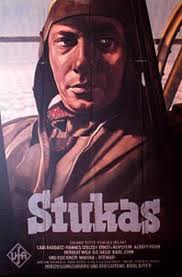Stukas (film)
| Stukas | |
|---|---|

Original film poster
|
|
| Directed by | Karl Ritter |
| Screenplay by |
|
| Starring | |
| Music by | Herbert Windt |
| Edited by | Conrad von Molo |
|
Production
company |
|
|
Release date
|
|
|
Running time
|
99 mins |
| Country | Germany |
| Language | German |
| Budget | 1,961,000 RM |
| Box office | 3.18 million RM |
Stukas is a 1941 Nazi propaganda film, directed by Karl Ritter and starring Carl Raddatz, which follows three squadrons of Luftwaffe dive-bomber (Stuka) flyers.
The plot largely alternates between combat and lulls in combat, with the exception of two narratives. In one, three of the flyers who have been shot down behind enemy lines make their way back to the German position, finally succeeding after one of them manages to talk a French unit into capitulating. In the other, a shell-shocked flyer whose doctor has prescribed "a profound experience" recovers the will to fight when he hears "Siegfried's Rhine Journey" during a performance of Wagner's Götterdämmerung at the Bayreuth Festival. (He has a flashback to his commander and the chief medical officer playing the same passage four-handed on the piano.) The film ends with them in flight on their way to attack England.
Stukas is an example of the Nazi contemporary film, or Zeitfilm, a type which Ritter, the scriptwriter and director, largely invented and championed as an answer to Russian revolutionary films. The film was commissioned by the Luftwaffe and presents participation in war as a joy. As a contemporary critic wrote, "Sheer enthusiasm transfigures the danger.... For [the dashing leader of the Bull's Squadron], ... fight is like intoxication, while for the squadron's captain of the 'cavaliers,' ... it is the elixir of life; for the captain of the Ninth, ... it is spirit, distance, concentration." Howard K. Smith wrote more disapprovingly in Last Train from Berlin: "It was a ... film about a bunch of obstreperous adolescents who dive-bombed things and people. They bombed everything and everybody. That was all the whole film was". The film emphasises "comradeship and self sacrifice"; we are shown the young pilots learning to deal with comrades' deaths for the greater good. As one character says to another, "[A man] doesn't really think about his comrades' death any more, only about what they died for". Like other Nazi war films, it makes heavy use of song; in a famous scene at the end, the squadron leader informs his pilots of their new mission against England and its dangers, we then see them seated in their aircraft, and the camera zooms in on their faces and then cuts to the clouds as they begin "ecstatic[ally]" to sing the "Stukaslied":
...
Wikipedia
